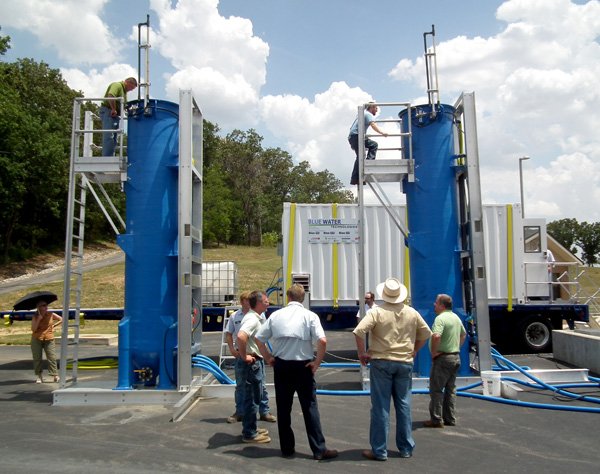DECATUR — More than 30 wastewater officials - including a team from the Arkansas Department of Environmental Quality - toured the pilot Blue Water Technology sand filter at the Decatur Wastewater Plant on Friday.
The Blue PRO filter is capable of bringing phosphorus levels down to undetectable levels, according to Tim Clark, an engineer for the company. It has been tested in Decatur since July 12 and will continue to operate until Wednesday.
High phosphorus levels have plagued Decatur’s wastewater treatment plant in past years and led to the building of the new plant in 2009. Decatur is currently meeting its phosphorus limit of 1 part per million, but the limit could be lowered atany time in the future.
“We know tighter limits are coming. We just don’t know when,” said Mayor Charles Linam.
Wastewater officials and engineers from a number of local cities, including Siloam Springs, Prairie Grove and Rogers, took part in the tour, along with employees from several engineering firms.
“We try to keep our eyes open to new technology. With the Illinois River and the Oklahoma Watershed issues, we’re always looking to keep an eye on the future,” said Adam Roark, an engineer for the city of Siloam Springs.
A team of 10 ADEQ employees toured the plantto examine the filter. If installed in Decatur, the filter will be the first of its kind in Arkansas and will have to pass ADEQ approval, city utilities director James Boston explained.
Linam described the machine’s performance as “fantastic” and said tests show it has been able to reduce phosphorus levels to .002 parts per million. Numbers below .003 parts per million are basically undetectable, according to Clark.
The pilot filter has two 18-foot-tall tanks full of sand and will process about 25 gallons of water per minute, Clark said.
The full-sized filter Decatur is considering will process about 3 million gallons of water a day, Clark said. Preliminary estimates from McClelland Engineering estimate it will cost the city around $1 million installed, according to Linam.
Sand filter technology has been around for 30 to 40 years, but Blue Water Technologies has developed its own patented system to work more efficiently, Clark said.
The towers are filled with silica sand that is coated with a small amount of Ferric Sulfate. As the treated wastewater is pushed up through the sand, the phosphorus clings to the sand, whichis eventually pushed up to the top of the tower, washed and reused. The phosphorus is chemically bound and leaves the wastewater plant as sludge.
The filter is also effective in removing a number of other contaminants, such as mercury, arsenic, chromium and uranium, according to the company website www.blueh2o,net.
It uses an extremely low amount of electricity and chemicals, and also produces much less sludge than the chemicals that are traditionally used to remove phosphorus, Clark said. Chemicals, sludge and electricity represent some of the plant's biggest expenses, he explained.
The technology for the filter was developed at the University of Idaho during the late 1990s, Clark said. Blue Water Technologies was founded in 2003 as a technology transfer company and grew to be an industry leader which has installed filters across the country and recently installed a system in South Korea.
News, Pages 9 on 07/27/2011

